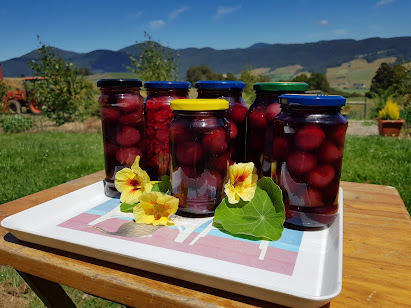Lush pasture and happy sheepies
There are current farming practices that, honestly, make me shiver. Living in a farming area, particularly cropping, I see it all the time. To what am I referring? The practice of killing off the remnants of the harvested crop with Round Up. Everywhere I drive I see brown, dead paddocks. It's quite horrific. To think what has been done to the soil makes me very sad. And what is in our food, the residual Round UP and long term, cumulative effects of ingesting it... well I won't even go there.
That is why it's so important for us to understand how soil ecology works and why the balance of nutrients benefits whatever we do on the land, whether it's a crop or livestock. Back to nature! That's our goal. Giving the land a chance to recover and renew itself benefits us all.
Happy sheepies

My garden
I have been quite obsessed with getting a garden established here, as even though the house is 101 years old, there was no 101 year old garden, unfortunately! The wind is an issue, up here on the hill, so windbreaks are essential to protect the house, the vegie patch, my studio and to provide corridors for birds. I have lost count of the trees we have planted on this farm and the new fences and hedges we've put in, but it's all starting to make a difference. My vegie patch and orchard is providing food for us, some of which I am learning to preserve, which has been fun! But, more importantly, these sheltered areas provide a sanctuary for us, places to enjoy being outside and to marvel at the beautiful views we are blessed with here. As with the rest of the farm, my focus is using no sprays where possible.Here's a short film of my summer garden. Enjoy! my summer garden
Dung beetles!
Dung beetles perform a vital function, by aerating the soil and by pulling nutrients and carbon back down into the soil. Why wouldn't you want that? Improving our carbon footprint by encouraging dung beetles is a simple method of helping the planet.
And that's something we all want, isn't it?






Comments
Post a Comment